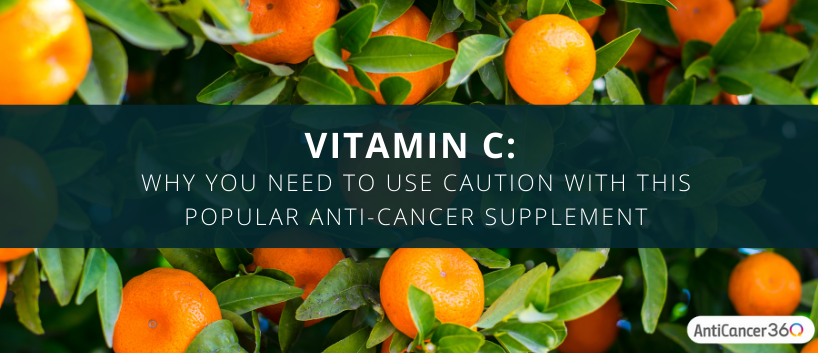You want to give your body every possible advantage if you’re fighting cancer. You’ll strive to nourish your body in a supportive way that sets you up for success. But, the choices can be overwhelming as you seek the answers to diet-related questions like:
- “What is the best cancer diet?”
- “What are the best cancer-fighting foods?”
- “Are there any foods to avoid with breast cancer? Or cancer in general?”
- “Should I take dietary supplements, and if so, which ones and how much?”
If you turn to a healthcare provider with questions like these, it can be frustrating to get vague answers, such as “eat whatever makes you feel good.” Of course, we want to feel good, but we also want to include beneficial nutrients that increase the odds of beating cancer!
Questions like these aren’t easy to answer. But, at AntiCancer360, we strive to find the best answers available, based on scientific evidence, to support you in your journey.
One approach to give your body a potential competitive edge against cancer is the integration of dietary supplements with proven anti-cancer benefits. One of which is vitamin C.
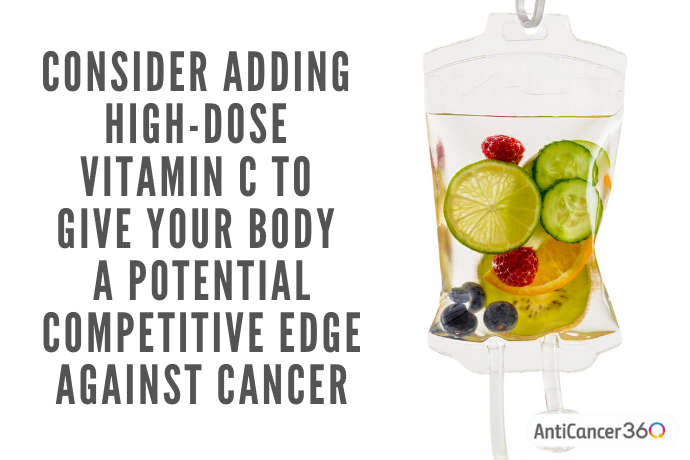
You’ve likely heard how important vitamin C is for your immune system. But you may not know how this vitamin can help people with cancer if used appropriately.
A wealth of scientific evidence has shown the potential anticancer benefits of vitamin C. In today’s post, we’re going to explore how the addition of vitamin C could benefit your overall anticancer program.
Keep reading to learn more about how to safely take vitamin C, its side effects, dosage, and whether you might consider adding oral or intravenous (IV vitamin C or “IVC”) while you’re fighting cancer.
About Vitamin C
Vitamin C is an essential nutrient that our bodies need for many biological functions like immunity, protein metabolism, collagen synthesis, wound healing, nutrient absorption, and antioxidant activity, to name just a few. Unlike most animals, the human body cannot make its own supply of vitamin C. So, we have to get our vitamin C from foods or dietary supplements.
Vitamin C is found in many delicious fruits and veggies. The list below shows foods that are rich in vitamin C (ranked from highest to lowest, per raw serving) [1]:
- Red peppers
- Oranges
- Kiwi
- Green peppers
- Strawberries
- Grapefruit
- Broccoli
- Cantaloupe
- Cauliflower
- Tomatoes
Side note: It’s best to consume these foods fresh because cooking and prolonged storage can destroy many nutrients, and the juice forms (orange juice, grapefruit juice) often contain a ton of added sugar.
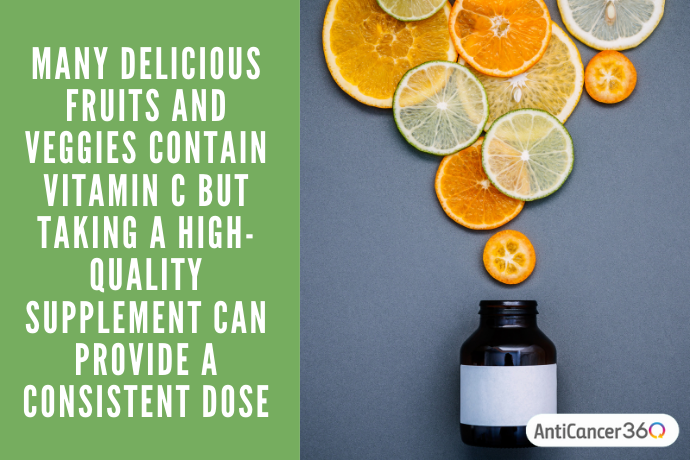
Besides eating these healthy foods, an efficient way to consume vitamin C is by taking a high-quality dietary supplement. Vitamin C supplements come in many forms that you can take by mouth: tablets, capsules, powders, liquids, gummies, etc. Vitamin C is also available as an intravenous infusion (directly into your veins), also called IV vitamin C or “IVC.”
Other names for vitamin C include ascorbic acid, ascorbate, L-ascorbic acid, and L-ascorbate [2].
Vitamin C for Cancer?
The role of vitamin C in cancer has been a controversial topic for decades. Some scientific studies and case reports have shown a clear benefit for vitamin C in treating cancer, including remarkable long survival times, while other studies have not shown any advantage over a placebo [3],[4],[5].Many of these studies were small and different dosages were used, making it really difficult to compare one study’s results to another.
Overall, vitamin C as a potential cancer treatment is considered somewhat controversial, but it is widely used. And, to be clear, the Food and Drug Administration (FDA) has not approved vitamin C as a cancer treatment.
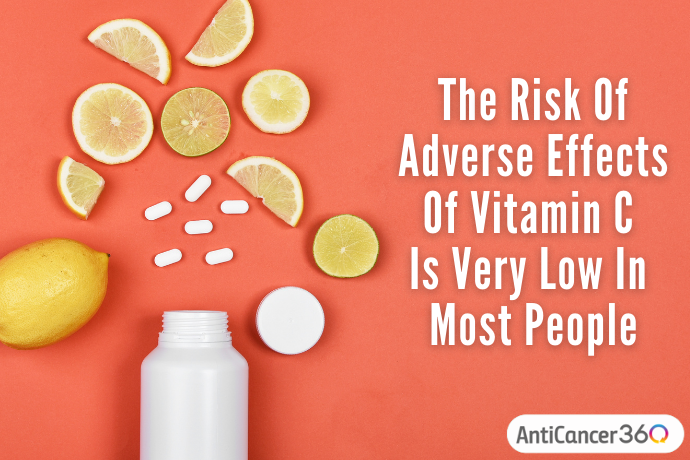
But, as we’ll explain more later, the risk of adverse effects from vitamin C supplements is extremely low. When used at the proper dosage in the right situation, it’s our position that vitamin C can provide numerous anticancer benefits. As always, we recommend that you consult with your oncologist or other healthcare professional before starting any dietary supplements, including vitamin C.
Next, we will look at how vitamin C affects cancer cells at the molecular level. In particular, we’ll learn how vitamin C can interrupt the metabolic processes that normally allow cancer cells to grow and multiply.
Cancer Metabolism Suppression: How to Starve Cancer with Vitamin C
Cancer metabolism is how cancer feeds itself with nutrients and makes energy for its growth and survival. A critical strategy when fighting cancer is to take advantage of certain drugs and supplements to starve cancer cells —while still nourishing healthy cells.
This approach weakens cancer cells, making them more vulnerable to treatments. And vitamin C is one of many natural substances you can use to starve cancer. Now, we’ll explain the science behind this and how it can help you.
Vitamin C May Disrupt Glucose Metabolism in Cancer Cells
Cancer cells have different metabolic needs than that of healthy tissues. Because they grow and multiply so rapidly, cancer cells require a lot of energy, and they “like” sugar. Sugar (glucose) is the primary energy source for many cancers. Altered metabolic processes allow cancer cells to convert glucose into energy, even when resources —like oxygen— are limited within the tumor.
It’s said that “cancer likes sugar” because tumor cells are often equipped with extra “sugar-transporting machinery” compared to normal cells. This is known as the “upregulation” of GLUT1, a cell surface protein that physically moves glucose out of the bloodstream and into cells. Since cancer cells tend to grow more GLUT1 transporters on their surface than normal cells, GLUT1 makes an excellent target when researching and developing anticancer treatments [6].
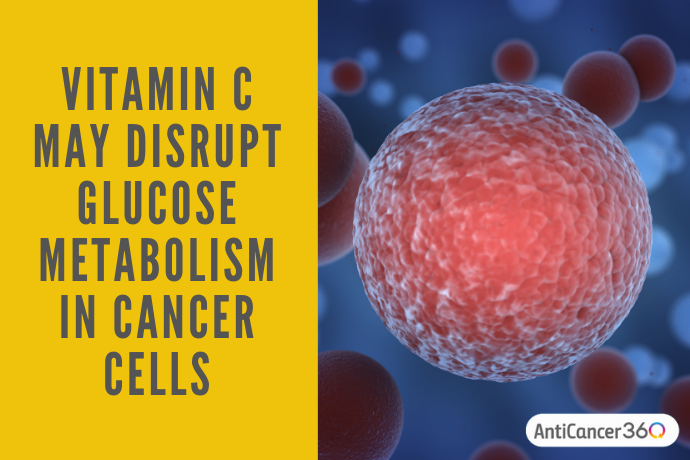
A fascinating scientific finding is that GLUT1 transporters seem to “mistake” the oxidized form of vitamin C for glucose and transport it into cells. (Vitamin C, also known as ascorbic acid, gets converted in the body to its oxidized form: dehydroascorbic acid.) As a result, GLUT1 can transport vitamin C into cells, in addition to its role in sugar transport.
Research has shown that when certain colorectal cancer cells are exposed to high-dose vitamin C in the lab, their growth is slowed [7]. This is thought to occur because the increased influx of oxidized vitamin C into the cancer cells causes an accumulation of reactive oxygen species (ROS). Like a chain reaction, the increased ROS slows down the process of glycolysis, which is the process cells use to convert sugar into energy. Without glycolysis, the ultimate result is increased cell death.
The idea is that vitamin C seems to “trick” cancer cells. The cancer cells think they’re placing an order for more sugar to fuel their growth. But, instead of getting sugar, they get a swift delivery of vitamin C. Vitamin C seems to have the exact opposite effect: it slows or stops the cancer cell growth. Overall, vitamin C may increase ROS inside cancer cells, disrupt the conversion of sugar into energy, and contribute to cell death.
Note that this chain of events is unique to high-dose vitamin C only. Evidence shows that low-dose vitamin C may actually protect the cancer cells. This is because, in low concentrations, once dehydroascorbic acid (the oxidized form of vitamin C) passes through GLUT1 into the cancer cell, where it accumulates and seems to get converted back into vitamin C [8],[9].
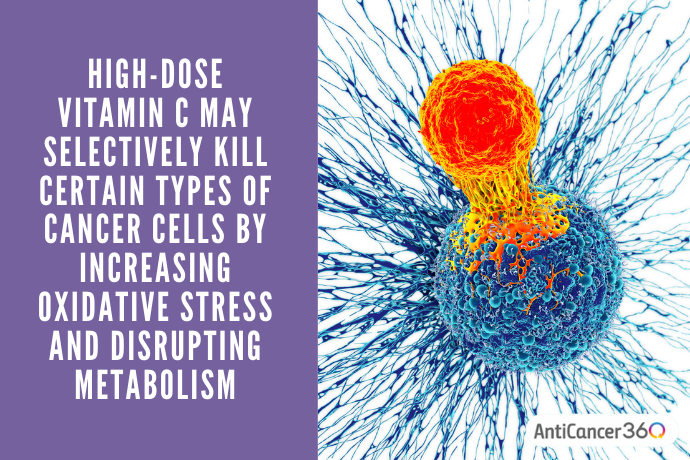
Then, vitamin C enters the cell mitochondria (where energy conversion occurs) and seems to lower ROS. This protects the cell from oxidative damage and allows it to continue generating energy. This protection is a desirable benefit of vitamin C in healthy cells, but not in cancerous cells.
So, low-dose vitamin C supplements, such as 500 milligrams (mg) per day, should generally be avoided while fighting cancer. (We’ll discuss the recommended dosage of vitamin C later in today’s blog post. Additionally, this advice does not mean you should avoid vegetables or fruits that contain vitamin C!)
Cytotoxic effects of Vitamin C
Besides the glucose-related action of vitamin C, laboratory studies have shown that high-dose vitamin C promotes oxidative stress in cancer cells, leading to toxic effects that interfere with cancer cell survival [10]. It’s been well-documented that vitamin C enacts direct and specific cytotoxic (cell-killing) effects on cancer cells via a chemical reaction that generates hydrogen peroxide. In this sense, high blood levels of vitamin C may act as a pro-oxidant weapon against cancer cells [11].
Findings from cell studies (referring to cells in test tubes) have shown other cytotoxic effects of vitamin C, such as:
- Disrupting iron metabolism in non-small-cell lung cancer (NSCLC) and glioblastoma cells [12].
- Activating self-destruction pathways called autophagy in prostate cancer cells [13].
- Inflicting DNA damage in sarcoma cells, and also blocking DNA repair processes [14],[15].
- Blocking a specific enzyme to kill colorectal cancer (CRC) cells with certain gene mutations called KRAS or BRAF (Note: these gene mutations affect about half of all CRC, but KRAS and BRAF mutations are not unique to CRC. Therefore, vitamin C may benefit other types of tumors. For example, it’s estimated that 90% of pancreatic cancers and about 30% of lung cancers have KRAS mutations.) [16],[17]
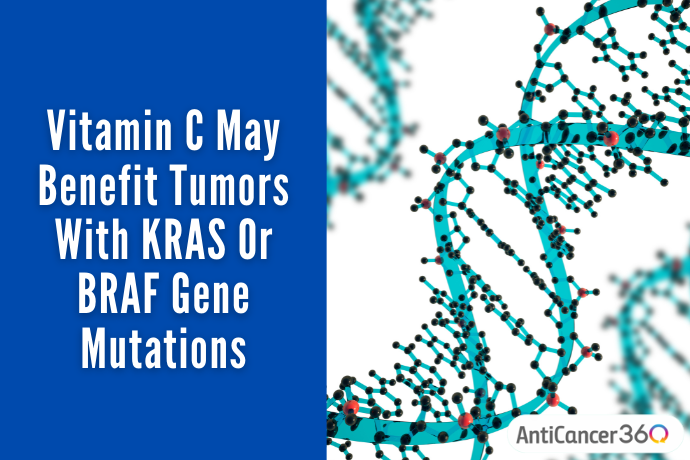
In preclinical (cell or animal) research, exposure to vitamin C has led to reduced proliferation of several types of cancer cell lines, such as prostate, pancreatic, liver, colon, mesothelioma, and neuroblastoma [18].
Next, let’s look at what the research tells us about the use of vitamin C in cancer.
An Aggressive Integrative Approach with Vitamin C
In this section, we’ll highlight just a few of the studies that have demonstrated the potential anticancer effects of adding vitamin C to cancer treatments like chemotherapy or radiation. Additionally, numerous studies have shown that vitamin C may help relieve some side effects of oncology treatments.
But first, let’s quickly address the role of oral versus intravenous vitamin C. Researchers used intravenous vitamin C (IVC) in most of these trials, while some used IVC plus oral ascorbic acid. In general, IVC produces much higher blood levels of ascorbate than oral vitamin C. However, liposomal formulations of oral vitamin C lead to significantly higher blood levels than standard oral formulations [19].
Also, keep in mind that vitamin C naturally distributes more into cells and tissues than blood. The highest levels of vitamin C tend to accumulate in leukocytes (white blood cells), adrenal glands, eyes, pituitary gland, and the brain, with relatively low levels found in extracellular fluids, such as saliva, red blood cells, and plasma [20]. So, even if measured blood levels are not as high, oral supplements of liposomal vitamin C should still penetrate cells and tissues in significant concentrations [21].
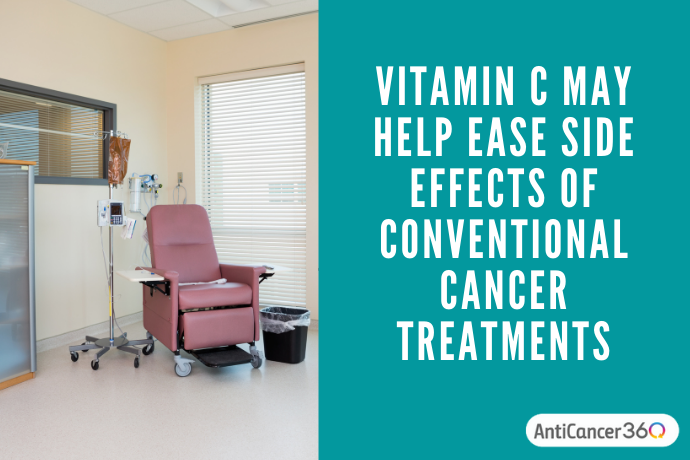
Now, let’s look at a few recent clinical studies.
A 2019 study in people with metastatic colorectal or gastric cancer demonstrated that high-dose IVC had a favorable safety and preliminary efficacy when used along with mFOLFOX6 or FOLFIRI. mFOLFOX6 is a chemotherapy regimen that includes oxaliplatin, leucovorin, and fluorouracil (5-FU). FOLFIRI is a chemotherapy regimen that consists of irinotecan, leucovorin, and 5-FU. More studies are needed, but, so far, these results are promising [22].
A 2007 study investigated the effects of vitamin C on health-related quality of life in 39 people with terminal cancer (various types). The participants received two 10-gram infusions of IVC twice per week and 4 grams of oral vitamin C daily for one week. All participants reported significantly reduced fatigue, nausea, vomiting, and pain, along with improvements in things like their appetite and emotional health [23].
In 2014, researchers found that the combination of IVC with the conventional chemotherapy drugs carboplatin and paclitaxel showed a reduction in chemotherapy-related side effects in a small study of people with ovarian cancer. They also showed that the combination synergistically inhibited ovarian cancer in mice [24].
In a small study of 14 people with pancreatic cancer, three-times-weekly IVC was safely integrated with gemcitabine, a chemotherapy drug. One of the participants was found to have a “remarkable tumor response” after nine cycles of IVC plus gemcitabine, with imaging showing tumor shrinkage to the point that they were able to have a surgical resection. (Before participating in the study, this individual was ineligible for surgery due to the tumor’s mass and location.) [25]
In 2020, a study looked at 424 people undergoing radiation for breast cancer. The findings showed that high-dose vitamin C was more effective in reducing a radiation-related inflammatory marker called NLR compared to low-dose vitamin C and a control group (who received radiation without vitamin C). This finding is important because elevated NLR has been associated with worse outcomes, including higher mortality, in people with breast cancer [26].
There are currently several ongoing clinical trials studying the potential anticancer effects of IVC. Talk to your healthcare team to decide if a clinical trial or IVC is the right choice for you [27].
How To Use Vitamin C: Dosages, Side Effects, and Precautions
Vitamin C Dosage
No standard dosage of vitamin C has been established to treat cancer. Injectable vitamin C is an FDA-approved product, but it has not been approved for cancer specifically. The typical dosage of vitamin C for cancer, based on science-guided experimental use, is:
- Oral vitamin C (a.k.a. ascorbic acid): Ranges from 2 to 8 grams or more per day, depending on the formulation [28].
- Intravenous (IV) vitamin C: Ranges from 10 grams per day up to 1.5 grams per kilogram of body weight three times weekly [29],[30],[31].
In general, we recommend avoiding low doses of oral vitamin C, such as 500 mg per day, since this may actually help protect the cancer cells. The timing of your doses is also important. For example, you may want to avoid taking vitamin C on the days you receive chemotherapy. For more information about this, see the Interactions section below.
The Food and Nutrition Board (FNB) has established the following recommended daily allowances (RDAs) for adults [32]. RDAs are the minimum amount required for a healthy adult to avoid becoming deficient in vitamin C:
- Male: 90 mg per day
- Female: 75 mg per day
The FNB recommends not to exceed 2000 mg (2 grams) of vitamin C per day. However, the FNB states that this maximum does not apply to individuals who are receiving vitamin C for medical treatment [33].
Side Effects of Vitamin C
Vitamin C is well-tolerated, both orally and intravenously, and doesn’t usually cause severe side effects.
At oral doses greater than 2 grams per day, some people develop [34]:
- Abdominal pain
- Heartburn
- Headache
- Diarrhea
- Nausea
- Vomiting
These side effects may be minimized for oral vitamin C by gradually increasing the dose until you find the highest you can tolerate that doesn’t cause digestive upset (such as diarrhea).
High-dose vitamin C is not safe for everyone. You shouldn’t take it if you have kidney problems or glucose-6-phosphate dehydrogenase deficiency. Also, oxalate kidney stones have been reported in people with and without a history of prior kidney stones [35].
Interactions with Drugs and Supplements
There are no significant drug interactions with vitamin C. There have been reports of possible minor drug interactions, as listed below:
- Alkylating agents. Some experts think that antioxidants like vitamin C could reduce the activity of chemotherapy drugs that generate free radicals, such as cyclophosphamide, chlorambucil, carmustine, and busulfan [36]. In contrast, other experts suggest that antioxidants might make chemotherapy more effective by reducing oxidative stress that could interfere with the death of cancer cells [37].
- Antitumor antibiotics. For the same reasons described above, there is controversy over whether vitamin C can help or hinder the activity of antitumor antibiotics, such as doxorubicin.
- Bortezomib (Velcade). Studies have suggested that vitamin C supplementation interfered with the effectiveness of the cancer medication bortezomib [38].
Other interactions to know about:
Vitamin C can affect the absorption of certain other vitamins, minerals, or drugs, such as iron supplements.
Vitamin C supplements may also cause falsely elevated results when monitoring blood sugar levels using a home glucometer. To avoid hypoglycemia (very low blood sugar), which can occur from treating false high glucose readings, be sure to talk to your healthcare provider before increasing your dose of insulin or other diabetes medications while taking vitamin C.
Many unknown potential interactions may occur while taking vitamin C. This is not a comprehensive list of all possible interactions. Before taking other medications or supplements, you must consult with your doctor or healthcare professional before adding vitamin C to your treatment plan.
Will Vitamin C Strengthen Your Battle with Cancer?
Overall, you can see that there can be many potential benefits to adding high-dose vitamin C to your overall anticancer program.
And ultimately, when using the “Aggressive Integrative Approach” to cancer, the goal is to fight cancer from every direction. This approach includes integrating natural supplements to fight cancer based on available evidence, despite limited human data, and doing it in a safe way that won’t interfere with your oncology treatments.
So now here’s the question… Why not fight cancer from every possible angle, using every safe and low-risk tool available to you?
To learn more about the AntiCancer360 approach, please watch our free online webinar to see if we can help you. And at the end of the webinar, you can book a free call with a member of our team. On the call, we will discuss your case in detail and see if you’d be a good fit for our program.
Please discuss the risk-versus-benefit potential with your healthcare professional before starting any natural supplement, including vitamin C.
Dr. Patricia Weiser is one of AntiCancer360’s consultant pharmacists, science advisors, and medical writers. Her expertise helps us create safe herbal and supplement combinations and avoid potential drug interactions.
Patricia is a graduate of the University of Pittsburgh and a licensed pharmacist. She has clinical experience in both community and hospital pharmacy. She is passionate about integrative and preventative care and strives to empower her patients to take an active role in their health.

